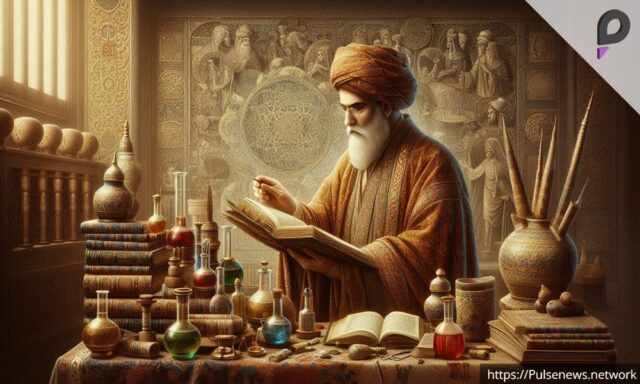Ali ibn Sahl Rabban al-Tabari was a Persian scholar and polymath whose contributions to medicine, astronomy, ethics, and philosophy greatly enriched the Islamic Golden Age. His comprehensive works reflect a deep integration of knowledge from diverse cultures, making him a key figure in the history of science and medicine.
Early Life
Ali ibn Sahl Rabban al-Tabari was born around 838 CE in the city of Merv, located in present-day Turkmenistan. He hailed from a scholarly and well-respected family. His father, Sahl, was a learned man and played a significant role in his early education. The intellectual environment of his upbringing set the stage for al-Tabari’s future accomplishments.
Family Background
Al-Tabari’s father was likely a Zoroastrian who later converted to Islam, which was not uncommon during this period in Persia. This cultural and religious backdrop may have contributed to al-Tabari’s diverse outlook and his ability to synthesize knowledge from various traditions.
Education
Ali ibn Sahl Rabban al-Tabari received a robust education in multiple disciplines. His early studies included Persian and Indian medicine, as well as Greek philosophy. He was well-versed in Arabic, Syriac, and Persian, which allowed him to access a wide range of scholarly works.
Teachers and Mentors
Though specific details about his mentors are sparse, al-Tabari was likely influenced by the rich intellectual milieu of the Islamic Golden Age. His education would have included studying under notable scholars of the time, possibly including those at the renowned medical schools in Baghdad.
Diverse Disciplines
Al-Tabari’s education extended beyond medicine. He studied astronomy, philosophy, ethics, and literature. This broad knowledge base allowed him to make significant contributions across various fields, reflecting the interdisciplinary approach characteristic of Islamic scholars of the era.
Career and Contributions
Ali ibn Sahl Rabban al-Tabari’s career was marked by significant contributions to medicine, philosophy, and science. His work in these areas left an indelible mark on the intellectual landscape of the Islamic world.
Medical Contributions
Al-Tabari is best known for his pioneering work in medicine. His most famous book, Firdous al-Hikmah (Paradise of Wisdom), is one of the earliest comprehensive medical encyclopedias in Islamic history.
Firdous al-Hikmah
The Firdous al-Hikmah is divided into seven sections, covering a wide range of medical topics:
- Anatomy and Physiology: Detailed descriptions of the human body and its functions.
- Pathology: Discussion of various diseases and their causes.
- Pharmacology: Information on drugs, herbs, and their uses.
- Hygiene and Dietetics: Guidelines for maintaining health through proper diet and hygiene.
- Surgery: Insights into surgical procedures and techniques.
- Mental Health: Observations on psychological well-being and disorders.
- Miscellaneous: Additional topics, including medical ethics and the history of medicine.
Integration of Knowledge
Al-Tabari’s work reflects a synthesis of Greek, Indian, and Persian medical knowledge. He drew from the works of Hippocrates, Galen, and Indian medical texts, integrating them into a cohesive medical framework.
Contributions Beyond Medicine
While medicine was his primary focus, al-Tabari also made notable contributions to other fields, including astronomy, ethics, and literature.
Astronomy
Al-Tabari’s interest in astronomy is evident in his discussions about celestial bodies and their movements. He contributed to the understanding of planetary motions and their impact on human affairs, blending scientific inquiry with philosophical thought.
Philosophy and Ethics
Al-Tabari wrote extensively on ethical issues, exploring the moral dimensions of human behavior. His philosophical works often intersected with his medical writings, particularly in discussions on mental health and the ethical responsibilities of physicians.
Literature and Writing
In addition to his scientific works, al-Tabari was a skilled writer. His eloquent style and ability to convey complex ideas in an accessible manner helped disseminate knowledge to a broader audience.
Personal Life and Relationships
While detailed records of Ali ibn Sahl Rabban al-Tabari’s personal life are limited, it is evident that he was well-connected within the intellectual circles of his time.
Friends and Colleagues
Al-Tabari likely interacted with other prominent scholars of the Islamic Golden Age. His contemporaries would have included physicians, philosophers, and scientists, fostering an environment of collaboration and mutual learning.
Influence of His Social Circle
The exchange of ideas among scholars was a hallmark of the Islamic Golden Age. Al-Tabari’s relationships with his peers likely played a significant role in shaping his intellectual pursuits and expanding his knowledge base.
Experiments and Observations
Al-Tabari was not just a theorist; he engaged in practical experiments and observations that informed his medical and scientific writings.
Medical Observations
His work in Firdous al-Hikmah includes detailed case studies and observations of patients. These practical insights helped validate his theoretical knowledge and provided a foundation for future medical practices.
Astronomical Studies
Al-Tabari’s interest in astronomy led him to observe celestial phenomena, contributing to the broader understanding of the universe. His observations were part of a larger effort by Islamic scholars to chart the heavens and understand their influence on the natural world.
Legacy and Impact
Ali ibn Sahl Rabban al-Tabari’s legacy is enduring, with his contributions influencing generations of scholars and practitioners.
Influence on Later Scholars
Al-Tabari’s work, particularly in medicine, paved the way for future Islamic physicians like Avicenna. His integration of diverse medical traditions provided a model for subsequent encyclopedic works.
Enduring Recognition
Today, al-Tabari is celebrated as a pioneer whose interdisciplinary approach enriched the intellectual tradition of the Islamic world. His works continue to be studied and appreciated for their depth and breadth.
Modern Relevance
The principles and insights from al-Tabari’s writings remain relevant, particularly in the fields of medical ethics and holistic health. His emphasis on the integration of mental and physical well-being is echoed in contemporary medical practices.
Conclusion
Ali ibn Sahl Rabban al-Tabari stands as a testament to the rich intellectual tradition of the Islamic Golden Age. His contributions to medicine, philosophy, and science have left an indelible mark on the history of human knowledge. His legacy continues to inspire scholars and practitioners, reminding us of the enduring power of interdisciplinary inquiry and the pursuit of knowledge.











